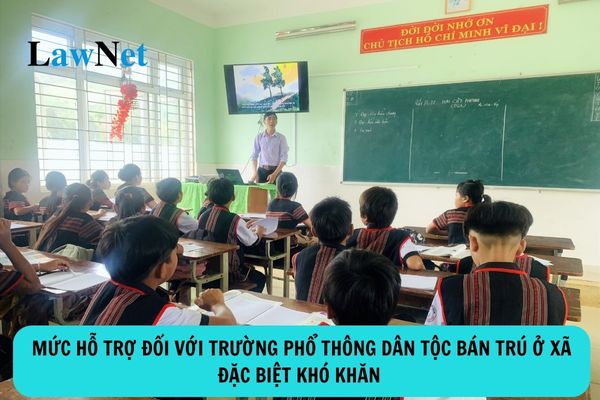Level of Support for Semi-Boarding Ethnic Minority Schools in Particularly Difficult Communes in Vietnam
Level of Support for Semi-Boarding Ethnic Minority Schools in Particularly Difficult Communes in Vietnam
Based on Clause 2, Article 5 of Decree 116/2016/ND-CP, semi-boarding ethnic minority schools in especially difficult villages and communes receive the following support:
- Investment in facilities and equipment, including dormitories, beds, kitchens, dining rooms, bathrooms, sanitation works, clean water facilities, and attached equipment for semi-boarding students according to current school design standards;
- Purchase, supplement, and repair of sports equipment, music instruments, televisions, serving cultural, sports, and other activities for semi-boarding students at the support level of 100,000 VND/semi-boarding student/school year;
- Establish a common medicine cabinet for the semi-boarding area, purchase common medicines with sufficient supplies to meet the requirements of disease prevention and handle emergency cases with a support level of 50,000 VND/semi-boarding student/school year;
- In the case of a semi-boarding ethnic minority school organizing group meals for students, financial support is provided to serve the cooking for students at a minimum fixed rate of 135% of the statutory pay rate/month/30 students. Extra amounts from 15 students onwards are calculated at one additional fixed rate; however, each school may receive no more than 5 times the fixed rate/month and no more than 9 months/year.

Level of Support for Semi-Boarding Ethnic Minority Schools in Particularly Difficult Communes in Vietnam (Image from the Internet)
Application Documents for Support Policies for Boarding Ethnic Minority Schools in Especially Difficult Villages, Communes in Vietnam
Based on Clause 4, Article 6 of Decree 116/2016/ND-CP, the application documents for support policies for boarding ethnic minority schools in especially difficult villages, communes include:
- Estimate requesting financial support and rice support;
- List of semi-boarding students currently studying at the school approved by the district-level People's Committee;
- List of semi-boarding students having to self-arrange accommodation.
How Much Rice Does a Student in Especially Difficult Villages, Communes in Vietnam Receive?
According to Point c, Clause 1, Article 5 of Decree 116/2016/ND-CP:
Support Level
- Students eligible for support policies under this Decree are supported with food, accommodation, and rice at the following levels:
a) Food support: Each student is supported monthly at 40% of the statutory pay rate and is entitled to no more than 9 months/school year/student;
b) Accommodation support: For students who have to arrange their own accommodation due to the school’s inability to provide semi-boarding, each month is supported at 10% of the statutory pay rate and is entitled to no more than 9 months/school year/student;
c) Rice support: Each student is supported with 15 kg of rice per month and is entitled to no more than 9 months/school year/student.
Thus, students in especially difficult villages and communes receive 15 kg of rice per month per student. The rice support is provided for no more than 9 months/school year per student.
What are regulations on the Rice Support for Students in Especially Difficult Villages, Communes in Vietnam?
Based on Article 8 of Decree 116/2016/ND-CP, the organization process for rice support for students in especially difficult villages, communes is as follows:
Step 1. Develop a plan to support rice for students
- The provincial People’s Committee develops a plan on the need for rice support for students of the school year with the following contents:
+ The number of students eligible for support: Summarize the number of students by individual groups, schools, and localities;
+ The amount of rice required for support (calculated for a maximum of 9 months/school year/student);
+ Rice receiving unit: The organization or unit assigned by the provincial People's Committee to receive the national reserve rice;
+ Estimated rice receiving time in the school year: Clearly specify the date and month of rice receipt (per semester receiving phases).
- The provincial People’s Committee reports the plan on the need for rice support for students of the province to be sent to the Ministry of Finance and the Ministry of Education and Training by June 30 each year.
Step 2. Decision on rice support for students
Based on the reports of the provincial People’s Committees, the Minister of Finance issues the Decision on rice support for students of the localities in the school year; the time of issuing the Decision on rice support is before July 31 each year.
Step 3. Transportation and delivery methods
- National reserve units self-organize the transportation of national reserve rice to support students and deliver to the provincial rice receiving units at district centers, district-level towns, and cities of the supported provinces;
- The provincial rice receiving units organize the transportation of national reserve rice from the district centers, district-level towns, and cities of the province to the schools and distribute it to the eligible recipients.
* Rice delivery timing
The specific time for rice delivery is implemented according to the proposal of the provincial People's Committee but does not exceed 2 times per semester.
* Rice issuance process
- The Ministry of Finance is responsible for organizing the issuance of national reserve rice to support students in the localities;
- The provincial People's Committee organizes the reception and distribution of rice to eligible recipients as specified.
* Management and use of rice supporting students
- National reserve rice supporting students, upon issuance and reception, must be tightly managed;
- The Chairman of the provincial People’s Committee directs the provincial rice receiving units to proactively cooperate with related departments, organizations, and local governments to have a plan for timely distribution and delivery of national reserve rice to the right beneficiaries. The Chairman of the provincial People's Committee is legally responsible for the management, distribution, and use of rice supporting students in their localities;
- At the end of the school year, the provincial People’s Committee sends a report on the rice reception and distribution for students to the Ministry of Finance and the Ministry of Education and Training for summarization and reporting to the Prime Minister.

